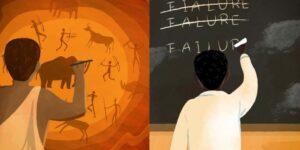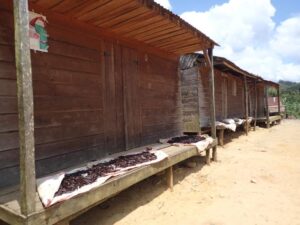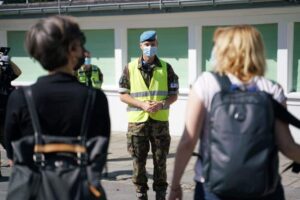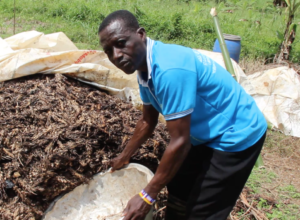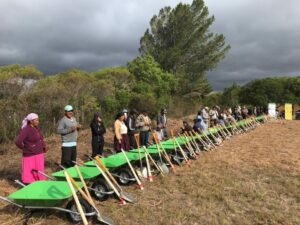
A new culture of failure in North-South research partnerships
Most of the people who appear in the documentary “Brilliant Failure in International Partnerships” are r4d researchers. A few outsiders bring additional perspectives on partnerships: what they fail at and how they succeed. There is a lot of smiling and laughter in the film. This may be because it is unusual to speak so openly about things that do not go as intended.
“We are good at selling failures as successes,” says the geographer Sabin Bieri from the University of Bern in the film, “that’s how we are conditioned.” “Failure is always a question of perspective,” says economist Ronaldo Morales from Bolivia. For example, publications in internationally recognised journals are enormously important for researchers in the North, while they may be of little benefit to partners in the South and therefore less desirable for them.
According to Sabin Bieri researchers in the South should take the initiative more often and be active themselves instead of waiting for instructions. “Often they simply anticipate what we want, what we consider as success.” Because after all in many cases those who pay also give orders, or as Pia Hollenbach, one of the five project leaders, says: “Money is still a very powerful argument”.
“Failure is always a matter of perspective.”
Ronaldo Morales, University San Andrés, Bolivia
The Nepalese sociologist and conflict researcher Bishnu Raj Upreti is convinced that researchers from the North are not genuinely interested in development goals, although he admits that there are a few exceptions: “If you don’t have money, they never think about equal partnership”. In his opinion, for a partnership to work, the partners in the South would have to be involved in all financial and strategic decisions. “But that will never happen. It’s a power play.” What distinguishes the documentary “Brilliant Failures” is that it also contains critical statements like these, which were authorised by all interviewees.
“The film describes the concerns that researchers have about international partnerships,” Nishara Fernando explains. The project officer from Sri Lanka does not share Bishnu Raj Upreti’s negative experience: “Most researchers from the North that I have worked with have discussed the allocation of the project budget with their partners in the South before submitting the project proposal.” He is only aware of a few cases where the project budget was decided without consulting the partners from the South.

Picture 1:Elizabeth Jimenez and Ronaldo Morales during a video call. Credit: Storytex and Brickwall.
“Failure is always also an opportunity to deepen something. A failure is not a break, but an opportunity for a course correction,” says filmmaker Sonja Schenkel. Pia Hollenbach adds that unfortunately crises are rarely perceived and used in this way. People prefer to avoid pain and blame others: “We suppress the pain we feel when things don’t work out well in a partnership. We then like to argue that it’s not professional, that the others don’t deliver, that they don’t do as agreed. We cling to this matrix and believe we have security there.” But emotions must be given space and discussed, she is convinced: “Emotions are not wrong. They can be the motor for something new.”
“Failure is always also an opportunity to deepen something.”
Sonja Schenkel, Paititi Lab, Switzerland
The five-member project group agrees: “Since you can’t avoid failures, you should at least learn from them.” Besides Nishara Fernando from Sri Lanka, the two Europeans Pia Hollenbach and Sonja Schenkel, it consists of Eliud Birachi from Kenya and Elizabeth Jimenez from Bolivia. In the invitation to a Brilliant Failure Workshop, they write: “we want to reveal that a new culture towards failure will provide the ground for true learning opportunities as an option to serve as an impetus for improvement and change. To accept failures as an inevitable and valuable aspect of life in general and innovation, will improve the way we work, negotiate and succeed in partnerships.”
Evaluating failures differently
“We learn from our mistakes”, one says, but the conditioning of our society towards perfection and success runs deep. “Most of the time we evaluate failure in terms of right or wrong. The interviews also showed that,” Sonja Schenkel recalls. “It would help a lot to connote failure more with learning and innovation. Because those connections are clearly there.” Incidentally, the concept and various academic, social and political initiatives on Brilliant Failure originated in the Netherlands. Nishara Fernando argues: “Brilliant Failures help to learn from experiences, which in turn reduces future failures. For me, this project is an eye opener.”
The framing narrative of the film is a poetic animation holding together the hard, the honest, the insightful and the amusing. This was not planned from the outset rather it is itself a kind of Brilliant Failure, born out of a difficult situation. As Pia Hollenbach recalls, “it was important for us to bring different people into relation with each other to talk about the topic.” However, due to the outbreak of the Covid pandemic right at the beginning of the project, in person meetings were not possible for a long time. Instead, there were only video calls, the quality of which was not good enough for a film. Thus the idea of a complementary animation was born and the project group quickly realised that they should invest the travel costs they save thanks to Covid into this.
“Failure is always a matter of perspective.”“Brilliant Failures help to learn from experiences, which in turn reduces future failures. For me, this project is an eye opener.”
Nishara Fernando, University of Colombo, Sri Lanka
Sonja Schenkel wrote the script and the text for the animation. She already knew other products by Sasha Langford, an Illustrator at a London agency, which she liked: “The clearer you know what you want, the easier the collaboration is,” says the filmmaker. Sasha Langford developed and animated the images in close contact with her. “Making podcasts, being active on Twitter and having a great homepage – these things are almost expected as a matter of course nowadays, but as scientists we can’t just do it off the cuff,” Pia Hollenbach replies when asked about the costs of such a production. “Of course professionalism has its price. But when I see the results that come out of it, I find it absolutely justified. Something amateurish simply doesn’t do justice to what science has to say.”
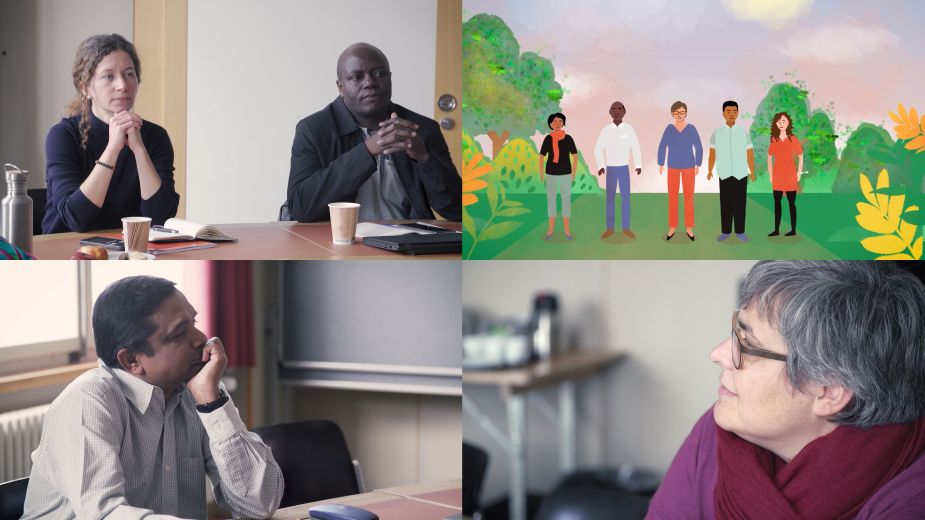
Picture 2:From left to right, top to bottom: Sonja Schenkel and Eliud Birachi, the project team illustrated by Sasha Langford, Nishara Fernando and Pia Hollenbach. Credit: Storytex and Brickwall.
While she tirelessly emphasises that all team members are equal, which is certainly true, it was Pia Hollenbach, coordinator of the r4d project “Waste of(f) life”, who had the original idea and started to connect everyone else. She shares a long friendship with Nishara Fernando, in addition to similar research interests and parallel academic careers. For the sociologist at the University of Colombo, it was an easy decision to be involved in the project: “As a researcher from the South, I have experienced some of the issues the documentary deals with myself.”
Pia Hollenbach had met filmmaker Sonja Schenkel as part of the r4d synthesis project Digital Storytellers: “Even then, I wished I could create something together with her one day,” she recalls. A positive encounter with Elizabeth Jimenez also resonated with her. The Bolivian economist eventually called in her Kenyan colleague and agricultural economist Eliud Birachi from the r4d project “FATE”. From then on it was teamwork and they wrote the proposal together. “The relations between us were very cordial,” Nishara Fernando recalls. “We took all decisions based on joint conversations which is why there were never any disagreements.” If you take a close look, you’ll be able to recognise the project team here and there in the animation.
“Hey, mistakes are something productive, even valuable!”
Pia Hollenbach, University of Lausanne, Switzerland
Is there a recipe for turning a failure into a brilliant failure? “First of all, we have to admit that it’s a failure, that’s the most important thing,” Pia Hollenbach explains. “Maybe the gut feeling says: something is no longer going the way it should. Everyone is no longer comfortable, someone may be withdrawing. Then we should ask in all openness what it is.” It may take courage and self-confidence to address a disagreement. Because you expose yourself and shake the system. The film also addresses this.
“In my opinion, we have a completely wrong culture of mistakes,” Pia Hollenbach says. “We are ashamed of it, repress it, don’t want to admit failure.” She has noticed this time and again in her work, which for years has included both development and research. “I claim that the culture of failure in science is even worse than in the development context. There is a lot of talk, but hardly any real reappraisal. Nobody asks: and what do we learn from this?” Nishara Fernando, however, perceives it differently from his perspective: “I think researchers in the North are more likely to accept failures as learning outcomes, while in the South they are seen as failures of the researcher or team.” One thing they agree on is to approach the issue positively. Pia Hollenbach says: “I want to tell people: Hey, mistakes are something productive, even valuable!”
More “us”, less “me”
As valuable as a diamond. The analogy with the diamond fits well. After all, brilliant is the cut that makes a diamond shine. But the diamond must first be discovered and recognised. Work is invested until it shines in all its brilliance. The same applies to failures. You have to recognise their value and potential and work on them, as inconspicuous and dirty as they may look at first glance.
In addition to researchers from r4d projects, who talk very openly about their experiences in North-South partnerships as well as resulting difficulties and ways of solving them, the film also contains inputs from “out of the box”. After all, partnerships shape our entire lives. Other experts, who deal with the topic in other contexts, were invited. One is Juana Quispe Alanoca, a social worker in the Bolivian highlands, working for the empowerment of women, indigenous people and farmers. She says: “We have everything to achieve the success we want. But it is never just individual success.” Influenced by the way of life of the Aymara indigenous people, Juana Quispe Alanoca advocates for a strong “us” where the group acts and takes responsibility and where there is not so much accounting of what one or the other has or has not done. It is also very soothing how Aymara deal with failure. “No one feels bad about it,” says Juana Quispe Alanoca, “they just say to themselves: if I didn’t make it today, I’ll just carry on tomorrow.”
“It is never just an individual success.”
Juana Quispe Alanoca, Bolivia
A strong sense of “us” also helped the project group to navigate the uncertainty of a global pandemic and achieve their goal despite all the obstacles. “The situation with Covid and the worldwide lockdowns demanded great flexibility on our part. We had to reinvent ourselves at least five times,” Sonja Schenkel recalls. Soon their video calls revolved not only about work, but also about solidarity, maintaining connections and simply asking: how are you doing?
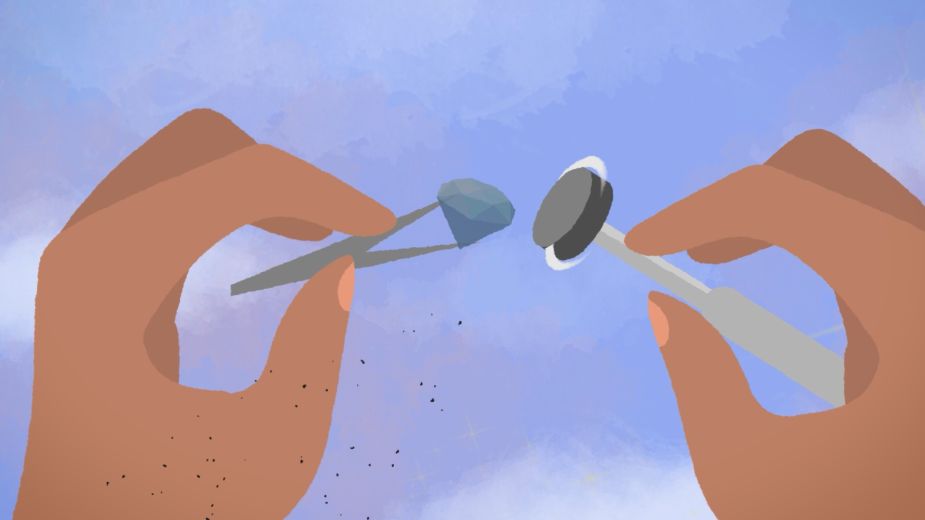
Picture 3: The work was worth it, the result is a beautiful diamond. Credit: Storytex and Brickwall.
One experience in particular has burnt itself into Sonja Schenkel’s memory. The group had not heard for a long time from a Sri Lankan staff member from whom they were expecting transcripts. Email enquiries remained unanswered. Until finally the woman contacted them from a camp where the authorities had isolated her because of a Covid infection. “As soon as she could, she came forward and finished her work,” Sonja Schenkel says. “Finally we understood why she had not reported and how difficult this situation must have been for her.”
It was not easy to carry out the interviews under these circumstances, Nishara Fernando recalls. They could not be conducted on site as originally planned and organising appointments for video calls sometimes required a certain persistence, but it was worth it: “The respondents I interviewed were all very open, critical and competent with regard to our topic,” says the sociologist.
“We always knew, no matter what: we have the same goal, the same utopia.”
Pia Hollenbach, University of Lausanne, Switzerland
“Trust in a common goal makes a relationship solid,” Pia Hollenbach is convinced. The project has confirmed this. “We always knew, no matter what: we have the same goal, the same utopia. We want a great output that inspires us and others.” They were supported by the r4d programme manager Claudia Zingerli who shared this attitude: “She always had our backs and signalled: You can do it.” The fact that there was no extra pressure from this side gave breathing space and allowed the team to stay focused. The result is a beautiful diamond. Be sure to take a look for yourself.
Links
The half-hour film “Brilliant Failure in International Partnerships” consists of three chapters, which are published as individual 8 to 10-minute videos on Youtube. They consist of video footage, recordings of zoom interviews and drawn animations and can be watched individually or as a group.
Chapter 1: What is Failure?
Chapter 2: Knowledge Management, Success and Leadership
Chapter 3: Partner Selection
German version of this article here.
